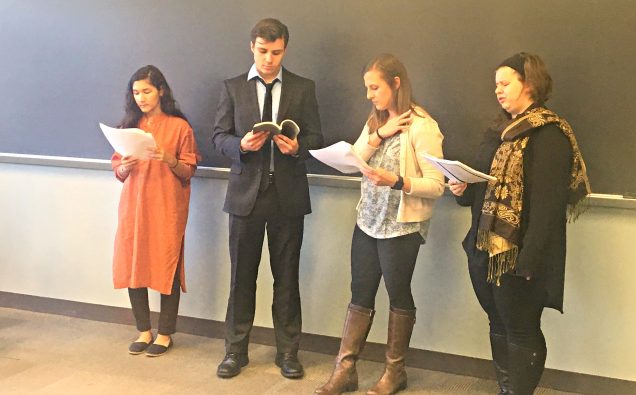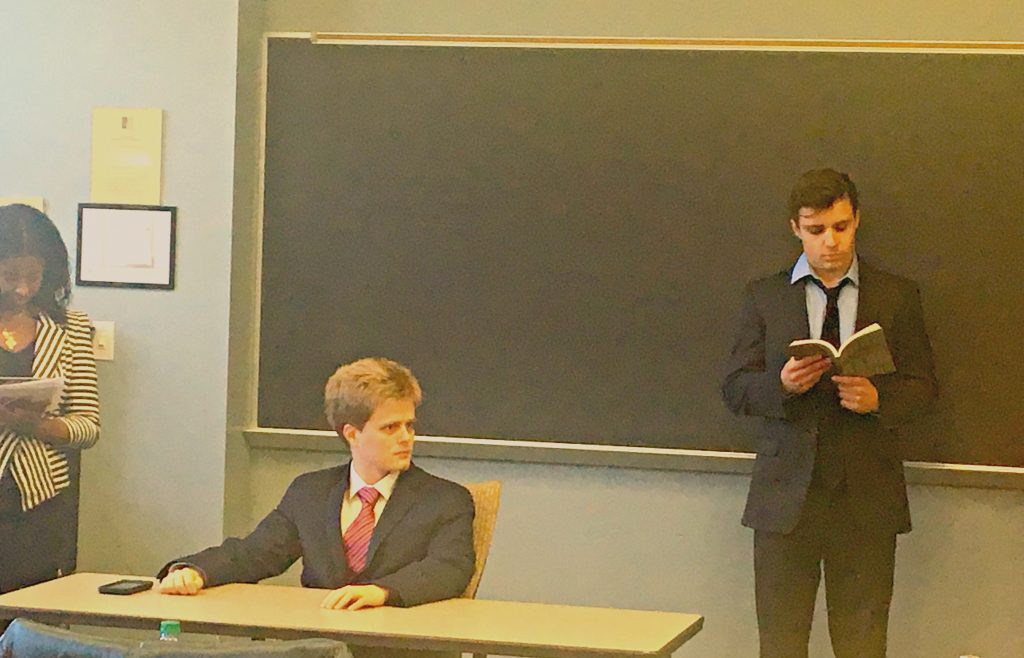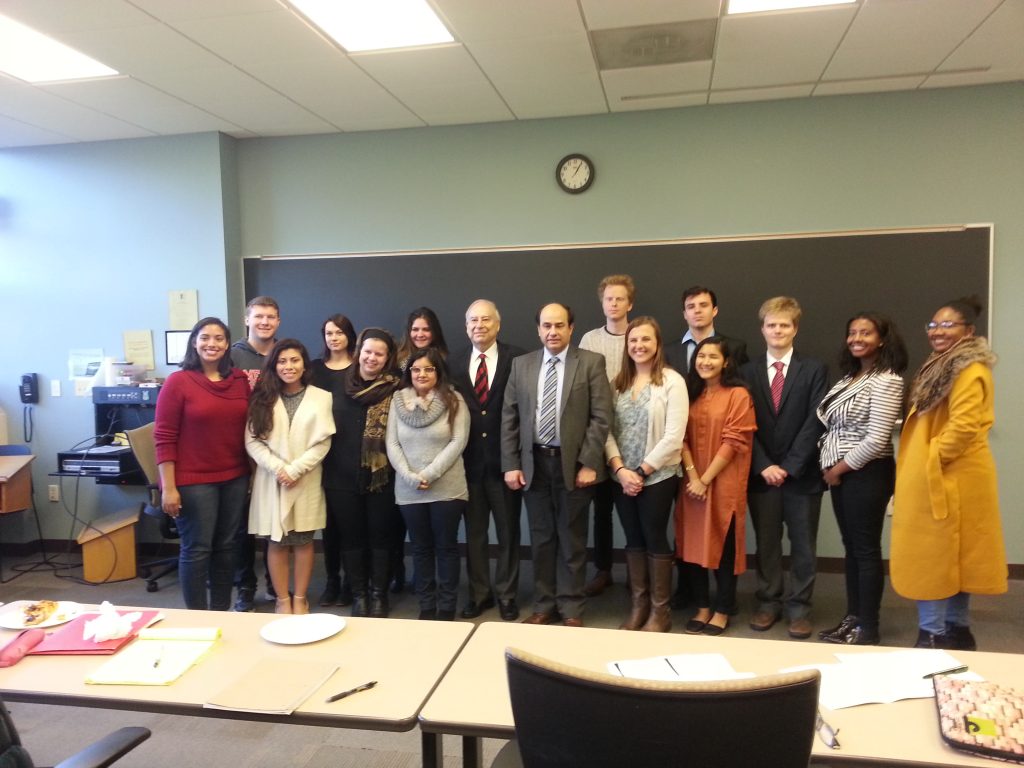
Photo : Character Ali, played by author Sam Hickey in an American University stage reading of play Noor
A look at the news coverage of events over the past few months would suggest that Muslims and the West are headed for a collision course.
The great clash of civilizations narrative is used as rhetoric for daily violence and is accompanied by intolerant rhetoric from religious leaders, politicians, and the media across the world.
This past New Year’s Day, Daesh’s ruthless terrorist attack on Istanbul’s Reina nightclub was defended through the narrative by attacking “the Christians [celebrating] their apostate holiday.” On December 19, 2016, twelve lives were taken in a Christmas market in Berlin, and the orchestrator, Anis Amri, again employed the clash of civilizations narrative by calling for Daesh supporters to seek, “revenge against ‘crusaders’ bombing Muslims.”
But the idea that these civilizations are irreconcilable and driven by an implacable hatred of the others’ values disregards our history of mixing cultures and breeds distrust in foreign governments and religious/ethnic minorities in the West and Muslim world.
Ambassador Akbar Ahmed, the Ibn Khaldun Chair of Islamic Studies at American University, actively combats this narrative and as a student in his course on the World of Islam, I was asked to experience the conflict from the perspective of a Muslim family through his play, Noor. In the World of Islam, Ambassador Ahmed explores the theology, internal divisions, and traditions of Islam and its relations to the other Abrahamic faiths through its history.
Speakers who visited the class to ensure the students could debate this subject with scholarly objectivity included such dignitaries as Arsalan Suleman, the acting U.S. Special Envoy to the Organization of Islamic Cooperation, Pakistani lawyer Yasser Latif Hamdani, and Rabbi Stuart Weinblatt. All of the speakers addressed negative impressions about heterogeneous Muslim identities, contemporary issues confronting Muslims, and the importance and challenge in promoting interfaith dialogue.
The course concluded with a stage reading of Ambassador Ahmed’s play Noor in which each student was asked to dress as and experience their character. The play seeks to express the modern voices of Islam as they respond to a tragedy that has become all too common in the modern Muslim world. The title of the play, Noor, means light, which emphasizes the goal of illuminating the ignorance surrounding the current state of Islam. To enrich our experience, we were honored with the presence of Ali Imran, Editor, Views and News magazine, who also played the role of Sufi master on stage a few years ago, for our reading of the play, and his appreciation for our efforts rang clear as he grappled to judge the best performance.

Ali, played by author Sam Hickey, unsuccessfully petitions the Deputy Minister of Justice for the release of his sister, Noor, in an American University stage reading of Prof. Akbar Ahmed’s play, Noor,
Noor tells of the dilemma many Muslim families face when their government’s security apparatus – often funded by the West – inflicts harm on peaceful citizens. The core of the play surrounds the varying responses elicited by these people. My character, Ali Hussein, is a lawyer working for a Government Ministry who is picked up by security officers with his sister, Noor, without committing a crime. Upon Ali’s release from the ironically called “Holiday Inn,” he and his two brothers debate viciously how to get their sister out of prison before she is dishonored in the most repulsive way. Each brother maintains a different perspective on the solution: for Abdullah, faith and divine intervention will bring her home; for Daoud, violent retribution against the state and the West is the only response, and his sister’s fate is in the hands of God; for Ali, working through the existing institutions and trusting the state to seek justice is the only way forward.
Ali embodies the modern Muslim who embraces globalization and legal institutions, and is fighting to uphold the ideals the founders of the state envisioned. However, his experiences at the “Holiday Inn” leave him mentally and physically scarred. His disillusionment is further exacerbated when he discovers the level of corruption that runs rampant through his beloved legal institutions. He is completely dismissed by the Deputy Minister of Justice while begging for the safe return of his sister unless he can collect a sizeable bribe. This encounter shakes him to his core. The institutions he spent his life propping up are just an illusion of justice, and he discovers that any efforts to unearth the truth can be overturned by something as material as money. His honor, pride, and self-respect are stripped in this encounter, leaving him at a complete loss as to what any man or woman can do to seek justice. Noor’s fate seems sealed.

Ambassador Akbar Ahmed and judge Ali Imran gather with Ahmed’s World of Islam students at American University following their stage reading of Ahmed’s play, Noor.
This experience is not unique to Ali, or to the Muslim world, or to the developing world, but is found throughout every community in the most modern of societies. Consider some examples highlighted by the Black Lives Matter movement in the U.S. – although a much different sociopolitical climate than other countries.
Noor sheds light on the many people who suffer humiliation at the hands of state and non-state actors and this universal theme is relateable for a Western audience. For a Western society that struggles to grasp the complexities of enforcing the Western concept of a nation-state on groups of people that have not identified as one people for centuries, Noor offers insight into their local struggle.
This play demonstrates how a simple act of injustice like illegitimate detainment can lead to extreme acts of vengeance and violence. This is representative of those acts we see throughout the Muslim world every day. In the end this play encourages patience and the path of non-violence, but overturning disillusionment is no easy task and without a clear path to pursue justice people will seek it outside of the state’s institutions. It is citizens like Ali that Muslim and Western governments must not ostracize.
Standing in Ali’s shoes before my class, I cannot say I had a transcendent moment where I understood the depths of grief that accompany such a tragedy. I can only imagine and hope that I would have as measured a response as Ali and civilly approach every authority figure that could possibly ensure my sister’s freedom. However, I fear there is a dark place deep inside that would pursue justice alone and, failing that, vengeance. My greatest revelation as I delved into my character and the forces driving the play is the immense amount of restraint required to choose the path of nonviolence. Whether that be through prayer and religious council or pursuing justice through the legal institutions of the state, both require faith in greater forces that relieve the afflicted family of any direct action from their arsenal. Tragedy can drive the most logical, loving people to a violent conclusion.
This experience only made me more certain that the dialogue between these two civilizations must be on a local level and not just government officials. Noor highlights dialogue between the internal divisions in Islam and the debate leads the majority of the cast to a nonviolent conclusion. The one missing element is interfaith dialogue and this is pointedly left out of Noor because many Muslim families never have the opportunity for dialogue with Western families. The clash of civilizations narrative blooms in darkness and ignorance, so the lack of exposure to the ‘other’ breeds the acceptance of this narrative as the new norm. Ambassador Ahmed actively, even aggressively, pursues interfaith dialogue amongst faiths both Abrahamic and non-Abrahamic, and these encounters combat the Muslims versus the West narrative. This course has encouraged me to emulate Ambassador Ahmed’s example by taking part in this dialogue throughout my life to build relationships, raise the level of debate, and encourage greater understanding to overcome this divide.
Noor highlights the complexities of the dilemma many Muslim families face, but there is hope for improvement. By recognizing the dilemma and bringing it to a Western audience in a palatable form, Ambassador Ahmed has taken a great step towards educating the West. With greater understanding, the world can work towards eradicating corruption and upholding institutions that seek justice. While the problems plaguing the Muslim world may seem very far away, we all have a role to play in pursuing justice across the world.












Very inspiring story for both Muslim and Non-Muslim world. Violence and misinterpretation can never bring peace.